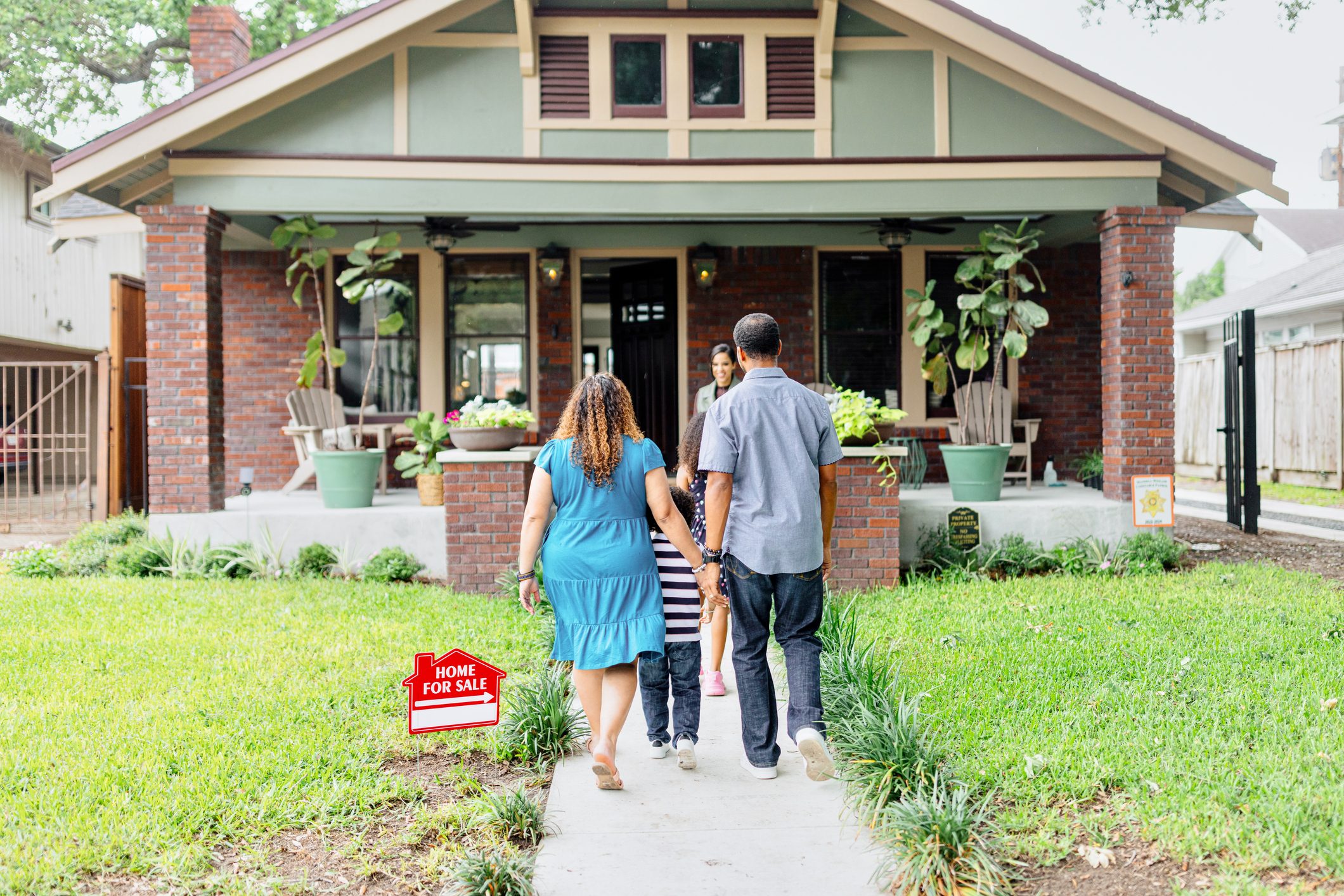Buying a home these days can be tricky with high mortgage interest rates—but these cities could be your best bet

Looking to Buy Your First Home? These 19 Cities Put Ownership Within Reach

Now can be a tough time to buy a home, especially as a first-time buyer, for a few reasons. Even though mortgage rates are slightly down from previous years, they are still high, and while inventory of both new and existing homes is increasing, prices are still rising about 10% year over year, according to projections by Realtor Magazine Media.
Because affording a home isn’t easy, people are waiting longer to make this major purchase: The median age of a first-time homebuyer is now 38 years old, which is an all-time high. And these buyers are getting help—25% of first-time buyers today receive financial assistance from relatives or friends in order to afford their homes.
Figuring out where to buy is another factor when finding your first home. The surge of remote work post-pandemic has enabled people to leave pricey big cities and settle down in places with better affordability, safer neighborhoods and better access to green space. More choices are always better, but narrowing it down can still be tough.
So where is the best place to buy right now for those new to the market? A new report from Consumer Affairs looked into the best cities for first-time homebuyers, taking into account a number of important factors. Read on to find out what the research uncovered.
Get Reader’s Digest’s Read Up newsletter for more home news, humor, travel, tech and fun facts all week long.
How did the report determine the best cities for first-time homebuyers?
Consumer Affairs analyzed America’s 150 largest cities across 11 different metrics in three categories: affordability, market strength and quality of life. (Affordability made up 40% of these metrics, market strength made up another 40% and quality of life made up 20% of the total points a city could earn.) The metrics included characteristics like median sale price, annual violent crime rate, access to green space, unemployment rate and more.
What is the best city for first-time homebuyers?
The city that took the top spot was Chesapeake, Virginia. Rich in history—and peach farms!—Chesapeake is also home to a thriving buyer’s market. Homes in this city are only on the market an average of 22 days before happy buyers snap them up.
Why did Chesapeake, Virginia, earn the No. 1 spot?

There are many reasons why Chesapeake, the second-most-populous city in Virginia, earned 84 out of 100 points on Consumer Affairs‘s rating scale. In addition to high home turnover, the median home price in Chesapeake is just 3.4 times the city’s median income, making it highly affordable. It’s also extremely convenient and centrally located, says Nicole DeSantis, a real estate agent with Century 21 Connect Realty who often works with first-time homebuyers.
“Chesapeake, part of the Hampton Roads metropolitan, offers an easy commute and many travel options—Norfolk International Airport is close by, plus the city is near major highways including I-64 and I-464,” DeSantis says. “It’s very easy to get to Norfolk, Virginia Beach and even North Carolina, all without paying the high home prices of those areas.”
Chesapeake also scored high marks on access to green space—the city has more than 80 public parks. “Safe, nearby outdoor areas are a huge draw for people who enjoy activities like walking, running and biking—especially pet owners,” DeSantis says. “Many first-time buyers can’t afford a home with a large yard, so having nearby parks offers a great alternative for outdoor space.” Access to parks can also be valuable for those planning to start a family, she adds.
What other cities scored high on the list?
The other cities rounding out the top three on Consumer Affairs‘s ranking—Virginia Beach, Virginia, and Fort Wayne, Indiana—also scored high marks on affordability, market turnover and access to public outdoor spaces. Here’s what makes these places attractive to first-time buyers:
Virginia Beach, Virginia
Virginia Beach, right next door to Chesapeake, has a lot going for it. For starters, it’s affordable, as well as ideal for people who love the outdoors. Nearly 70% of residents live within a 10-minute walk of green space; plus, it sits on the Atlantic Ocean. It also has an extremely low rate of violent crime (0.95 crimes per 1,000 people).
“Many first-time buyers live alone, making safety an even higher priority,” DeSantis says. “A low crime rate is crucial for making them feel comfortable committing to homeownership.” Looking ahead, she adds, first-time buyers will also consider crime rates for future planning: “A safe neighborhood gives them peace of mind when laying down roots and investing in a long-term home.”
Fort Wayne, Indiana
It may be the second-largest city in Indiana, but Fort Wayne has the lowest median home-sale price among the top cities analyzed in the report. Plus, it boasts affordable mortgage payments. This enables buyers to stay within their means, which is crucial for long-term financial stability.
“It’s important for first-time home buyers not to stretch their budgets too far because of the hidden costs of homeownership,” DeSantis says. “Many first-time buyers don’t fully account for additional costs—like moving expenses, furnishing costs, home maintenance and unexpected repairs—leading to financial strain after moving in.”
How did other cities compare?

Here’s a look at the full rankings of the report:
-
Chesapeake, Virginia
-
Virginia Beach, Virginia
-
Fort Wayne, Indiana
-
Aurora, Illinois
-
Gilbert, Arizona
-
Grand Rapids, Michigan
-
Overland Park, Kansas
-
McKinney, Texas
-
Toledo, Ohio
-
Amarillo, Texas
-
El Paso, Texas
-
Frisco, Texas
-
Lincoln, Nebraska
-
Laredo, Texas
-
Wichita, Kansas
-
Omaha, Nebraska
-
Oklahoma City, Oklahoma
-
Columbus, Georgia
-
Des Moines, Iowa
What else should you keep in mind when buying your first home?
Buying a home for the first time can be overwhelming—it’s a massive purchase that affects not just your finances but your whole life. But when you approach the process with a clear picture of your money situation and your priorities, you will be able to make smart decisions when it comes to finding the right home for you.
To help you through the process, we asked real estate broker Jeff Lichtenstein, CEO of Echo Fine Properties, for his top tips for first-time home buyers. Here’s what he advises his own clients:
-
Don’t overextend your budget. Try to stay within your means, even if that means going to the next town or county, or buying a fixer-upper and taking your time to remodel. Don’t stretch so much that you can’t afford furniture.
-
Keep resale in mind. Quirky homes can be fun, but if you ever need to sell your home quickly, you’ll be grateful if you choose one that doesn’t depreciate in a buyer’s market. Homes with features like open floor plans and two-car garages are easier to resell.
-
Buy for the future. If you plan to have a family someday, choose a home that fits your future needs so you don’t have to move again once you have kids.
-
Don’t overlook the inspection report. The roof, floors, AC, water heaters and windows are expensive replacements. Also pay attention to how much upkeep the home will need—maintenance can also get pricey.
-
Make sure you like the community. If you don’t like where you live, it doesn’t matter how much you love the house.
Remember that even when you feel like you might never find the right home, you just need to trust the process and try not to settle when you’re feeling exhausted by the house hunt. Your dream home is out there!
About the experts
|
Why trust us
At Reader’s Digest, we’re committed to producing high-quality content by writers with expertise and experience in their field in consultation with relevant, qualified experts. We rely on reputable primary sources, including government and professional organizations and academic institutions as well as our writers’ personal experiences where appropriate. We verify all facts and data, back them with credible sourcing and revisit them over time to ensure they remain accurate and up to date. Read more about our team, our contributors and our editorial policies.
Sources:
- Consumer Affairs: “Best cities for first-time homebuyers”
- Fannie Mae News: “Mortgage Rates Expected to Move Lower in 2025 and 2026”
- Realtor Magazine Media: “What’s Next for the 2025 Housing Market?”
- National Association of Realtors: “Migration Trends”
- Nicole DeSantis, real estate agent with Century 21 Connect Realty; email interview, April 2025
- Jeff Lichtenstein, real estate broker and CEO of Echo Fine Properties; email interview, April 2025



